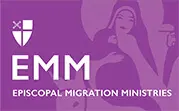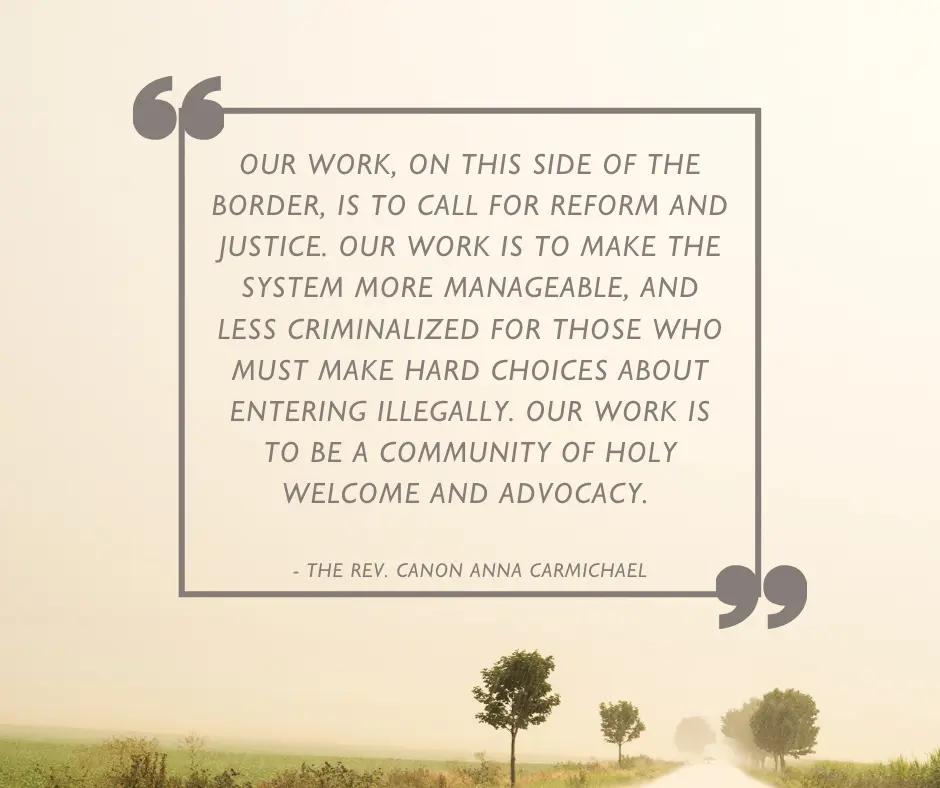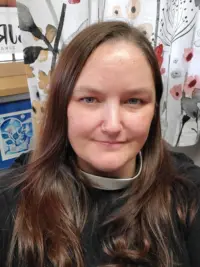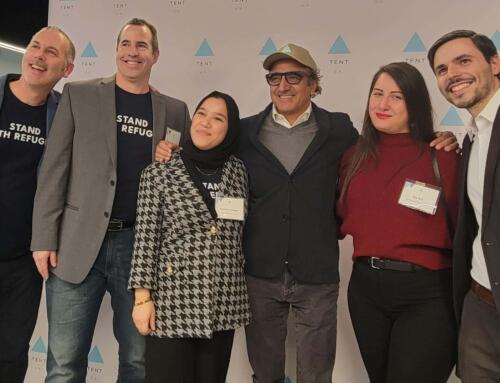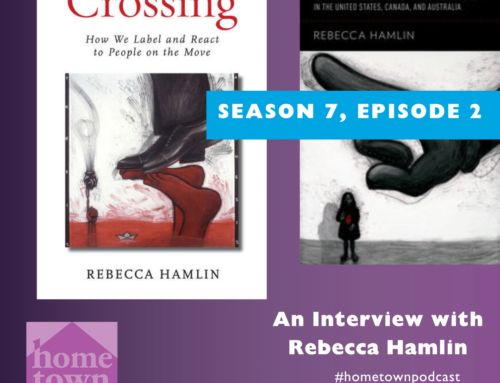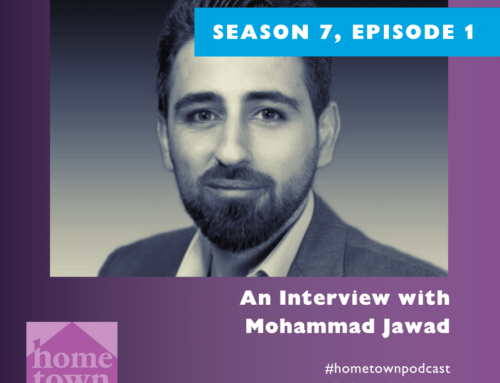A reflection from The Rev. Canon Anna Carmichael, Ph.D.
The question is often asked of those who enter the US illegally, “why don’t they just follow ‘the rules’ if they want to come in.” As a resident, born in the US, who has helped someone navigate the immigration system, I have to say that I am much more empathetic to those who lack the resources, both time and money, to “follow the rules”.
Beginning in 2017, The Episcopal Diocese of San Joaquin began discerning its call to Latin@ Ministry. At the same time, we were also discerning a call on how to best respond to the unjust immigration system in our country. In the fall of that year, we hosted the Presiding Bishop’s Revival and our theme was “A Safe Place for All God’s People.” That October we unanimously passed a resolution to create an Immigration Task Force, which later became known as SJRAISE (San Joaquin Refugee and Immigrant Support and Empowerment). These two events, along with our discernment, became pivotal moments in the life of this re-emerging diocese.
In 2018, Bishop David Rice and I began to have serious conversations about the calling of a Latin@ Missioner to the diocese. During General Convention, we had the pleasure of meeting The Rev. Deacon Nelson Serrano Poveda, who was supporting social media for Ethnic Ministries, and specifically for Hispanic/Latino Ministries. After several conversations with The Rev. Canon Anthony Guillen and his assistant, The Rev. Samuel Borbon, we knew that Nelson was the person we wanted to call to be our Missioner.
In January of 2019, I began working with Nelson and an immigration attorney that specializes in religious worker (R1) visas. The paperwork alone was overwhelming. The costs, even reduced by this attorney, were more than I could have imagined; when it was all said and done, it cost almost $5000 and there were no guarantees of his visa being approved. How are those with less financial resources able to afford this process? And how do they reconcile the costs with the very real possibility that they might not be approved for their visa? As our attorney told us, religious workers are one of the smallest groups of people to be approved; only 7% of the applications are approved annually, and much of the approval has to do with your sponsoring organization and the applicant’s country of origin. She was honest with me that Colombia was not a “preferred” country of origin for US Customs and Immigration Services or Homeland Security. Despite being a faithful person, I wasn’t completely convinced that Nelson’s application would be approved.
In the meantime, SJRAISE in conjunction with the diocese took on the task of raising awareness and money for the Legal Defense Fund for immigrants in our community. During what became known as the Pilgrimage of Hope (May 4-20), members of the diocese, both lay and clergy, along with Bp David, walked the 226 miles from Fresno to Sacramento to join with 1000 other voices and concerned citizens for California Day of the Immigrant. Among our representation was Nelson; not because his application had been approved, but because we were able to get him into the country on a visitor’s visa. While on the Pilgrimage, Nelson provided us with social media support as well as translation services. Nelson became one of us during the Pilgrimage, so when he departed Fresno a few days after the Pilgrimage had concluded, we were sad to see him go…would he be back with his R1 visa? If not, when would our paths cross again?
There are, I believe, miracles that happen every day, and on the morning of Christmas Eve, I received a text from Nelson that was a photo of his letter from US Customs and Immigration Services; his R1 visa had been approved! It was truly a miracle!
In January and early February 2020, Nelson worked with the Consulate’s office in Bogota to complete the required documents and fingerprinting, and with great joy, on March 4, 2020, a little over a year from the start of the application process, Nelson arrived at Los Angeles airport, ready to start his new ministry in The Episcopal Diocese of San Joaquin.
As of the writing of this reflection, we’re still encountering and navigating a few challenges…getting a social security card so he can open a bank account, get a driver’s license and purchase a cell phone, navigating the COVID-19 outbreak and the implications of said virus on Holy Week services (which are very important in the Latin@ community), and the postponement of Nuevo Amanecer. But those challenges are faced with faith and hope because we already overcame the biggest hurdle, which was getting him here.
When I think about the process of bringing Nelson into the country by “following the rules” I am continually amazed at how hard those rules can be. Now that he’s here, we are required to stay on top of the seemingly almost daily changes to the immigration policies of this country. In a couple of years, we will have to either apply for a renewal, a green card, or he’ll return to Colombia. Those decisions will also have financial implications. What this process has helped me realize is that our immigration system as it is now, is costly, is time-consuming, and requires dedicated legal professionals to help you make sense of it all. It is no wonder to me that people who lack financial resources or post-secondary education make the choices they make when leaving their country of origin. Unlike Nelson, there are so many who are fleeing corruption, violence, abuse, environmental devastation, and economic collapse; they don’t have the luxury of waiting a year and spending money with no guarantees. Our work, on this side of the border, is to call for reform and justice. Our work is to make the system more manageable, and less criminalized for those who must make hard choices about entering illegally. Our work is to be a community of Holy Welcome and Advocacy.
The Rev. Canon Anna Carmichael, Ph.D. serves as the Canon to the Ordinary in The Episcopal Diocese of San Joaquin. She is the diocesan liaison to SJRAISE and is Deacon Nelson’s housemate while he serves the diocese.
